Paul Nelson - Interview
by Lisa Torem
published: 17 / 3 / 2017
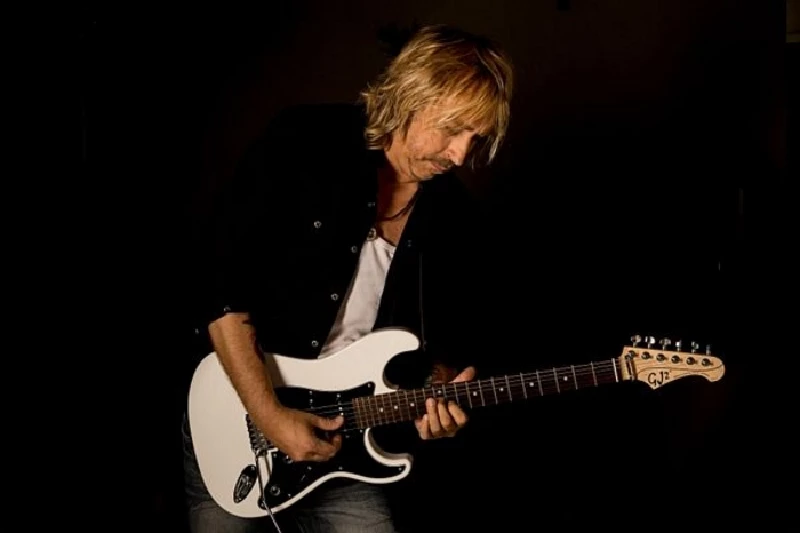
intro
American producer, arranger and guitarist and foremer Johnny Winter manager Paul Nelson talks with Lisa Torem about 'Badass Generation, his band’s debut album
I first met Paul Nelson when he was acting as de-facto manager of blues-rock legend Johnny Winter. He kindly invited me to meet Johnny in his touring van before a much-anticipated concert in a Chicago suburb. We fought through about a hundred fans lined up, clamouring for a glimpse of their icon – or even better, a signature. They stood outside, some quietly, some not so quietly, waving album covers in front of the window. Like the pro that he is, Nelson worked out a way to please the fans without wearing out his touring companion. Nelson’s duties had doubled since he had joined Winter's band as second guitarist. He began assuming managerial responsibilities after finding out that Winter was on a downward spiral due to drugs and mismanagement. Yet when the sandy-haired, Berklee College of Music alum was referred to as “manager,” he would often balk. The relationship between the two men came about organically. More than anything, they were bound together through a mutual love of roots music and an unquenchable desire to entertain and create. Nelson’s own career took off when he formed power metal band, Liege Lord, in the 1980s. It flourished with Johnny Winter. Through many world tours, on-air performances and recordings, he never lost sight of the basics: loyalty, friendship and the ability to have fun, no matter the venue, the audience, the genre or the medium. Johnny Winter passed away on July 16, 2014, leaving a lasting legacy and a mountain of admirers. He is missed terribly by the international blues community, but Nelson has made it his business to keep his spirit alive through the Johnny Winter All-Star Band, and through ‘Down and Dirty’, the documentary that chronicles Winter’s career, which Nelson executive produced. Paul Nelson is a mover and shaker. His rapid-fire, East Coast inflection radiates deep confidence. The only time it demurs is when he speaks of his friend and mentor, Johnny Winter. Nelson’s name appears everywhere. He’s worked with youthful artists like saxophonist Grace Kelly and is currently commemorating Junior Wells. He’s created an ongoing Grammy buzz with his production talents. ‘Step Back’ was blessed by his mentor and awarded by industry peers. And there’s always more to come. Perhaps the most special quality about this eclectic showman is his ability to communicate. He talks about the formation of the Paul Nelson Band, their debut album, ‘Badass Generation’ and what it takes to align current and old school values over the course of a dozen, original tunes. PB: Hi, Paul. Congratulations on ‘Badass Generation.’ Opener ‘Down Home Boogie’ reflects that late night vibe when one goes to a club and the musicians are playing their hearts out, after having granted the audience their requests. But first and foremost, how did you hand pick the band members? PN: When I was touring with Johnny, I was fortunate enough to meet musicians that would open for us or were on the road, and I just took names. The lead singer, Morten Fredheim – I had produced his album in Norway. I said if I ever get a band together, I’d love to use this guy, and he was available. He was on 'The Voice' over in Europe, in the top two. So I flew him over. I got our bass player, Chris Alexander, from Samantha Fish, the drummer, Chris Reddan, from Popa Chubby. He’s out with Mickey Hill now. I got the keyboard player, Mike DiMeo, and it was locked down. We spent all the time in the studio and stuff just started pouring out of me, the music. And we all had a love for a 70’s kind of vibe, so that played a big part. We were all fans of Free, but we didn't just want to draw from Free and Bad Company and Zeppelin. Everything that happened in that kind of time – Queen, Skynyrd and everything from Ted Nugent to Tom Petty – came into it. Luckily I signed with Sony and they gave me the freedom to do what I wanted to do, so that’s the result. PB: Did you produce ‘Badass Generation’ as well? PN: Yeah, and that’s hard. It’s like directing your own movie. PB: And you wrote all of the songs? PN: All of them. No covers. PB: How did you find time to write them while also fulfilling your production duties? PN: I wrote them on the spot. I would write in the mornings on guitar and then everybody would wake up and it was a lockdown. We didn’t go out to eat. Food came to us. It was just music. I had a few things that I’d been playing during sound checks and I’d worked on little parts, but basically it all just poured out. We were there for about three weeks with the writing and recording. Like I said, we were into ‘70s kind of stuff; I was into how things were mic’d. How did Boston get those sounds? I wanted to recreate a classic album, not like Pink Floyd’s ‘The Wall’, where there’s a theme throughout story wise, but musically. So all the songs had to make sense going into each other. I not only thought about the one song, I thought about how they moved into the next one. Those were the things that I saw that were the same in classic kind of records, like Aerosmith and that kind of thing; not only were they cool songs in themselves, but the way they overlapped into the next was also really cool. You notice on this album there are a lot of fades. Fades were a thing of the ‘70s. I’m big into fading. Labels aren’t into that that much right now. If you say you want to put a fade on; ‘Oh, no, everybody has an ending,’ so I really wanted to give that whole kind of experience. We studied that stuff before we did that. We all got together in the studio and we sat down and said: let’s just listen to this style of music. But I didn’t want it to be dated. In other words, I wanted the production value to be current, but at the same time I wanted to pay homage to the '70s through the lyrics and the way things were structured. I think we have a serious loss of front men now. Not that it’s my band, but I don’t know who the next AC/DC is. I don’t know who the next Led Zeppelin is. I don’t know who the new Who is. Everybody’s hiding behind the guitar and there’s these professional singers. I have a lot of peers and cohorts and all of a sudden it’s like: ‘Hey, I’m singing now,’ and they didn’t sing a year ago. I found the right guys. It was so inspirational to work with musicians of that caliber. PB: There's one song, ‘Goodbye Forever’ – the title conveys sadness, and yet you’ve arranged it with Frank Latorre’s blues harp and your dynamite solo. It’s a hybrid of upbeat optimism and letting go. PN: It’s two-sided. It’s happy and perky but at the same time it’s a relationship, saying: "Get lost." I wanted it to be like, this is really fun and exciting but I’m actually singing about something that is really bad. (Laughs). I’m glad that you noticed that. There’s some irony there. There’s a little homage to Johnny Winter there in my soloing. But we really wanted to write songs. I can play and I’m proficient at my craft and I can shred and all of that stuff, but this time I think people might be kind of tired of getting guitar lessons every time they listen to Paul. Let’s do what Brian May would have done. Let’s do what Page would have done. These are songs. PB: Is that Morten doing vocals on ‘Swamp Thing’? PN: Yes. Morten’s from Norway. But over in Norway, their English is proper English. They study the King and Queen’s English. It’s really perfect English. It’s almost too perfect. It’s like having penmanship that’s too perfect. You can’t read it. So I had to say to him: ‘Look, I need a Southern drawl.’ He asked, ‘What is that?’ 'Well, there are words that you can’t enunciate. You have to use words like “Y’all’ and then there’s the way you end phrases, words that aren’t proper English, abbreviations and commas. Like “fishin’” instead of “fishing,” and you have to get rid of all the “ing’s.”' I said, we really have to think of Duck Dynasty here. You have a guy who has never sung in that style. I said, 'Then, you kick in. Do your stuff with your lush harmonies, but we’ve got to feel like we’re in the Everglades—There’s alligators all around.' So the album and the songs, I wanted them to be very visual. PB: Is ‘Fooled by Love’ a showcase for Morten’s range? PN: He wrote the lyrics for that one, I wrote the music and it just meshed. He took off on that one. That was great. That’s like our would-be, classic rock kind-of-ballad, but still has a groove. None of those songs are fillers. The hardest part was deciding which song was going to go first, which one was going to go second. People buy songs individually and they break it up, but there’s a way in which all of those songs flow together, so even if you download them, I recommend that you keep them in that order. Play them together. It’s important. PB: ‘Step Back,’ featured guests such as Joe Perry and Billy Gibbons, and you've brought in more on this album. You have played with a diverse set of artists: Vince Gill, Slash, Hubert Sumlin and Los Lobos are just a few. Does that feed in to your approach? PN: That’s me. That’s what I studied to be. My teachings led me to be a session guy, because the only way to work was to be able to do as many things as possible to get those calls. There were guys that were great at one thing, but they were never getting call backs. There was a great jazz guy, and then he couldn’t get a country gig. And then there was a country guy and he couldn’t get a rock gig, but I always got the calls—you can play jazz, you can play rock, blues, this and this, and that’s why that album is all mixed up and that’s also why I was able to produce. For those albums like ‘Step Back’ and ‘Roots,’ it was a wide variety of guys. One minute you have, like you said, Vince Gill, and then two minutes later, you have Leslie West. How are you going to make this mesh together? That was the key to make those songs, make it a whole album and make it sound cohesive. And the fact that a lot of those guys were recording on different parts of the planet. A lot of times when you do those “friends” kind of albums, where people are sending in solos, it sounds different, it doesn’t sound like you guys were together; it sounds like it was just plopped on. So in putting those together, I not only figured out which artist would work best with which songs that Johnny picked; at the same time, I asked their engineers: What kind of amp did he use? What were the dimensions of the room? What kind of reverb? And then I would take their solos and make our sound blend in and I would have our parts recorded in the same size room with the same kind of reverb so it would mesh together. There was a lot of work in that respect so it didn’t sound so contrived, because we were doing all the parts on our end, but then the guests were flying stuff in, and that’s okay, but it has to sound seamless and there was a lot of work involved. PB: So how did you select the guests for ‘Badass Generation’? PN: I thought, I need keyboards, but I don’t want to saturate it with keyboards. Warren Haynes used to open up for Johnny all the time, he’s a good friend. He invited me to play at the Island Exodus in Jamaica that he does, with Warren and Sonny (Landreth), and Ron Holloway and Govt. Mule. I was just in the process of doing my stuff, and told him I needed a keyboard player. He said, let me get ahold of Danny (Louis, Govt. Mule.) He was available. I sent it to him. Boom. Frank Latorre was on both of Johnny’s albums. I knew I needed a little harp for a little dynamic on that song and as they develop you start hearing things, but you don’t want to go too crazy. Congas and this—it has to fit the song. PB: How much touring will you do in support of ‘Badass Generation’? PN: We’ve already done the Midwest which was great. We did the West Coast. I’m doing a few things and then we head back out there. Festival season is coming up. There’s a lot of stuff coming up in Canada and the East Coast. There’s talk of Europe. Plus, the other things I do; playing with other artists and producing. I’m up for a Grammy next month for the Joe Louis record. PB: And you recently produced James Montgomery. PN: That came out great with Jimmy Vivino… PB: You seem to enjoy paying tribute to those who came before you. PN: When Johnny took me under his wing, I saw what he did. I thought I knew all there was to know about blues, but Johnny was, ‘You’ve got to listen to this riff, you have to learn this song.’ In the blues world, they do that a lot, where they pass the torch and I think Johnny was doing that with me. I’m still honouring that. I listen to all that. I was with him for quite a long time. So whatever he listened to went in my head no matter what. If you sit and watch a TV show with somebody, whether you like it or not, it’s in your head. Musicians are like sponges so I absorbed a lot by playing. There’s a reason why he had me play with him and I appreciate that. I was totally a fan of his. He was my idol. PB: Johnny discovered you in a nearby recording studio and you bonded immediately. It was like it was supposed to happen. PN: Yes. Which leads us to the documentary, ‘Down and Dirty’, which describes the relationship we had. He was going through some bad times. He pushed the envelope. He had enough stuff in his system to make Ozzie look like he had training wheels. After the musical relationship and friendship developed, he confided in me: “I think I need some help here.” I said, “You definitely do.” Then I took on a different role of helping him. He had one hell of a comeback. The documentary portrays that. He was like a father to me. It was serious stuff. PB: What do you mean when you say he was like a father to you? PN: He took me under his wing and then all of a sudden the kid is helping the father. He teaches you enough and then all of a sudden it wasn’t a musician anymore. It was a family relationship. You’re on the road so much. Now you’re watching a human being that is falling apart; it’s a friend and you’ve got to help him or he’s going to pass away. The career is part of it, but day by day, he was in rough shape. There was a lot of stuff in his system that had to go and the trust that we had and the bond that we had. He knew when I said you have to stop drinking and you have to stop taking pills… He was on Methadone for 35 years by the time I met him. I had to wean him off without letting him know. He changed completely. PB: What’s currently happening with the documentary? PN: It’s all over the planet. In February, it got released in Japan. It’s on Amazon, iTunes. You can rent it, buy it. It’s doing really well. I put together a Johnny Winter All-Star Thing. Edgar (Winter) has been part of it. Warren, Sunny (Landreth), Earl Slick; a whole bunch of people. Sometimes we’ll show the movie and sometimes we’ll have shows at theatres showing the movie. It covers Johnny’s life. It covers obsessiveness, what happens to an elderly icon when they kind of push the envelope, the comeback, the history of blues, the history of rock. Joe Perry’s in it, Billy Gibbons, Warren Haynes, Johnny’s first guitar teacher and Edgar, of course. I’m really proud of it. Johnny saw the whole movie and he heard the whole finished record and he said to me when we were playing the mixes: “Paul, if we don’t get a Grammy for this, they’re nuts.” And I go, “You don’t do it like that, it would be nice, but let’s just put out a good record.” He was at a point in his life where he wanted awards. He said, I’m at the age where I want awards. I said, you get your act together and they’ll be coming and they did. They really did. PB: I saw you and your colleagues at Buddy Guy’s Legends when you held a memorial concert on Johnny’s behalf shortly after he died in 2014. There was so much love in the room. PN: People knew how important it was. That was a list of celebrities. That was a great show. The quality of the music was really great, too. It wasn’t just thrown together. PB: There’s a Paul Nelson signature guitar, “PN Jr.” available for collectors and fans. PN: It just came out. Delaney Guitars made me a guitar. I gave them specs: the type of pick-ups and the type of body style, things that I needed to let them know how to create what I would like to be a road dog kind of guitar — something that would be good for the studio and good for the road. So a lot went into it and I’m happy with it – the colours, and the finish is nice. PB: So Happy New Year, by the way. What do you look forward to in 2017? PN: (Laughs). More touring. I’m working on a Junior Wells Project for Cleopatra Records. I’m producing the whole thing. Derek St. Holmes is doing some vocals for a project I’m producing for an artist. I’m going to the NAMM show and I have the Grammy’s coming up for Joe Louis Walker and I’m excited about that. We’ve already got nominated, so that’s great. A lot of guest appearances and a lot of working with the Uptown Horns. Everybody is having me guest on their albums. I just finished Yonrico Scott’s album, which is great, ‘Life of a Dreamer’. And I’m working on my next record, too. PB: Will that be a hybrid of genres? PN: It will be like this, just whatever comes out of me and I’m glad that I’ve been afforded the opportunity to do that. I’m very fortunate. I’ve done so much and it kind of heaps up on you and you don’t see it happening because you’re caught up in the moment. And then all of a sudden, Wow. You did this and this and this. I just saw they posted my appearance with Johnny on the David Letterman Show and that was a great moment, playing with him. It was a real comeback moment. It shot him back up, so it was very cool. And my album just got released in China yesterday. I finished recording guitar for the number one singer of The Voice in China. It was my band and Bryan Adams’s band. It was done by a top-notch producer in China, so that was a big deal over there, and to have my release released at the same time… Forget about the politics behind all of these countries. It’s musical people and fans. That’s very exciting because we did tour there with Johnny and we were very well-received. PB: Thank you, Paul. PN: Thank you.
Band Links:-
http://paulnelsonguitar.com/https://en-gb.facebook.com/The-Paul-Nelson-Band-1519832368337964/
https://twitter.com/paulnelsonguit1
Play in YouTube:-
Picture Gallery:-
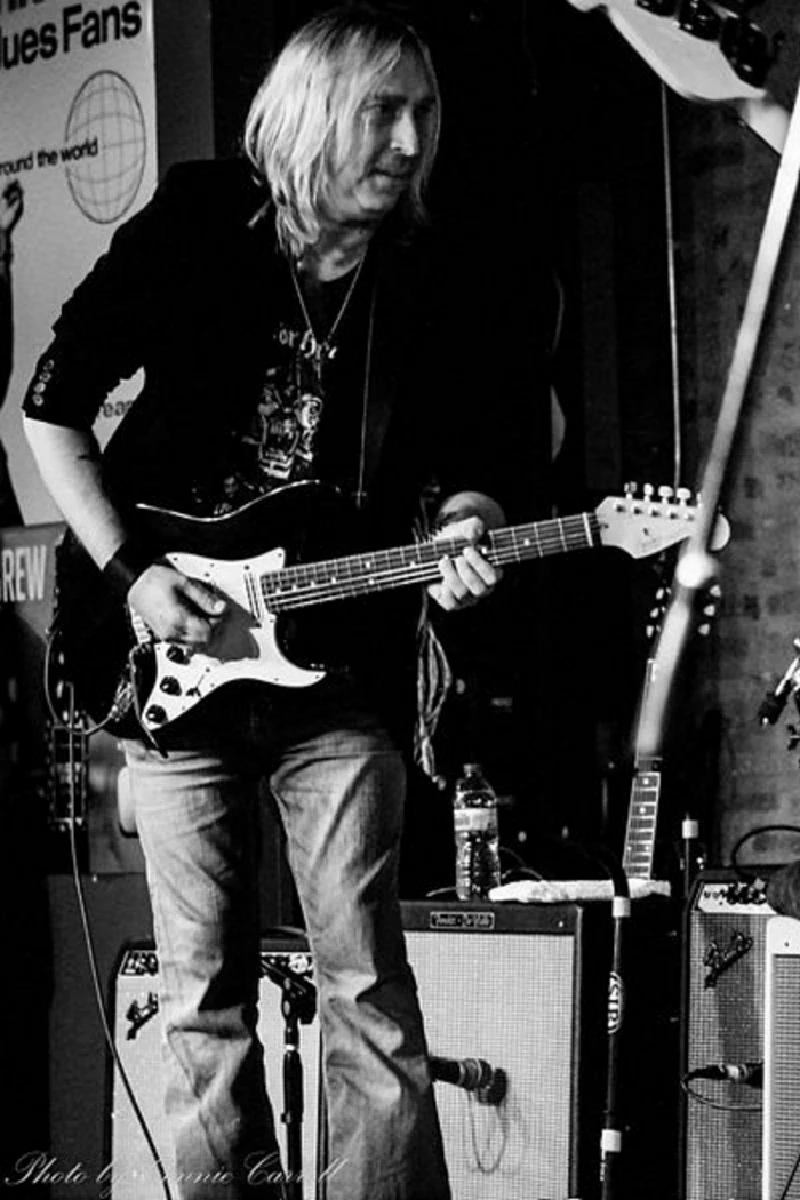
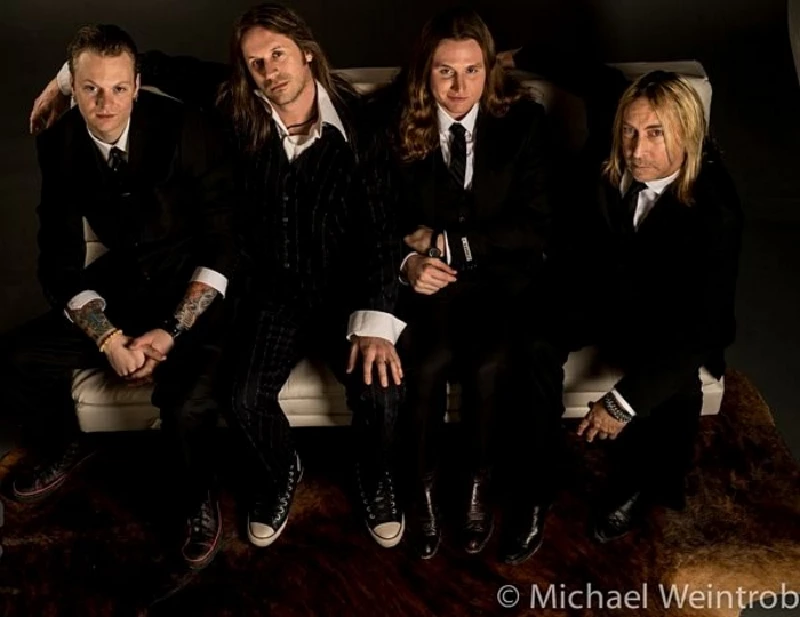
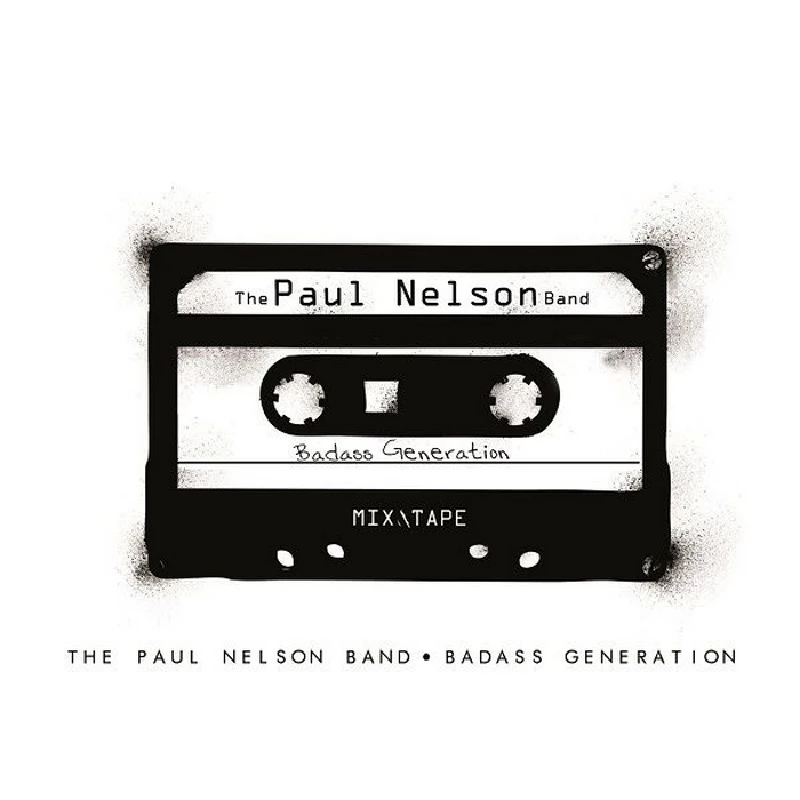
interviews |
|
Interview Part 1 (2015) |
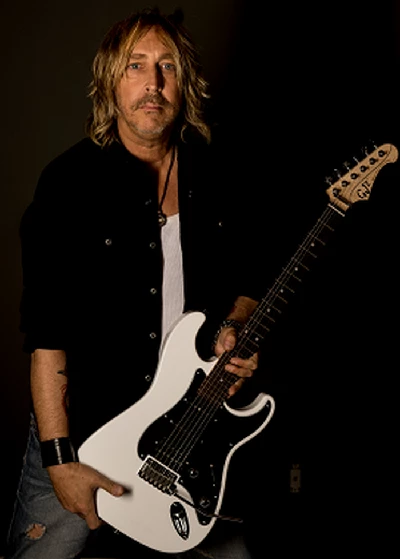
|
| In a two part interview Paul Nelson, the long-term guitarist and producer for Johnny Winter, who died last year, talks about his relationship with Winter and his posthumously released album, 'Step Back' |
| Interview Part 2 (2015) |
| Interview (2010) |
most viewed articles
current edition
Spear Of Destiny - InterviewRobert Forster - Interview
Fiona Hutchings - Interview
When Rivers Meet - Waterfront, Norwich, 29/5/2025
Carl Ewens - David Bowie 1964 to 1982 On Track: Every Album, Every Song
Brian Wilson - Ten Songs That Made Me Love...
Chris Wade - Interview
Pistol Daisys - Waterfront, Norwich, 29/5/2025
Credits - ARC, Liverpool, 17/5.2025
Gary Numan - Berserker
previous editions
Heavenly - P.U.N.K. Girl EPBoomtown Rats - Ten Songs That Made Me Love....
Barrie Barlow - Interview
Manic Street Preachers - (Gig of a Lifetime) Millennium Stadium, Cardiff, December 1999
Oasis - Oasis, Earl's Court, London, 1995
Dwina Gibb - Interview
Pixies - Ten Songs That Made Me Love...
David Paton - Magic: The David Paton Story
Chuck Prophet - Ten Songs That Made Me Love...
Sound - Interview with Bi Marshall Part 1
most viewed reviews
current edition
Peter Doolan - I Am a Tree Rooted to the Spot and a Snake Moves Around Me,in a CircleGarbage - Let All That We Imagine Be The Light
Vinny Peculiar - Things Too Long Left Unsaid
Little Simz - Lotus
John McKay - Sixes and #Sevens
Suzanne Vega - Flying With Angels
HAIM - I Quit
Morcheeba - Escape The Chaos
Vultures - Liz Kershaw Session 16.06.88
Billy Nomates - Metalhorse
Pennyblackmusic Regular Contributors
Adrian Janes
Amanda J. Window
Andrew Twambley
Anthony Dhanendran
Benjamin Howarth
Cila Warncke
Daniel Cressey
Darren Aston
Dastardly
Dave Goodwin
Denzil Watson
Dominic B. Simpson
Eoghan Lyng
Fiona Hutchings
Harry Sherriff
Helen Tipping
Jamie Rowland
John Clarkson
Julie Cruickshank
Kimberly Bright
Lisa Torem
Maarten Schiethart